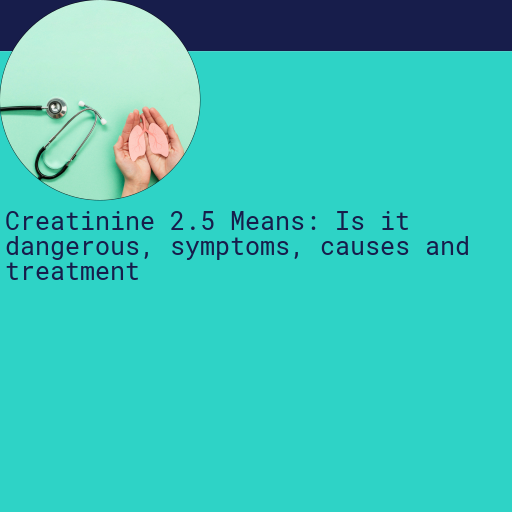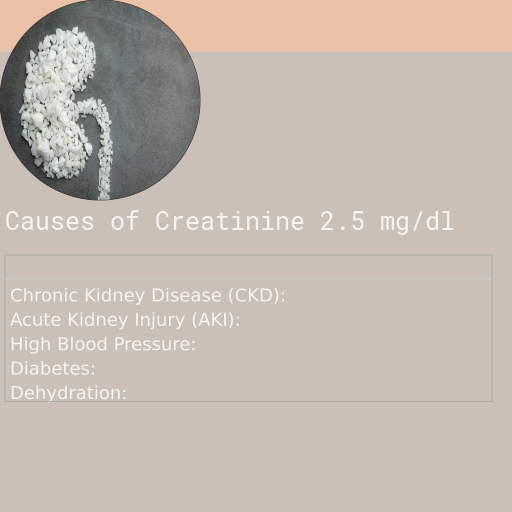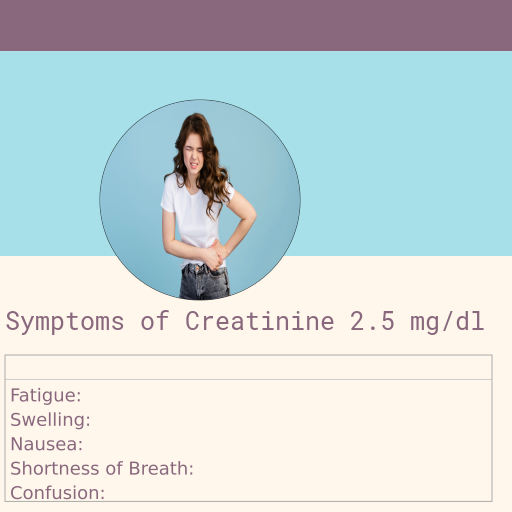Creatinine 2.5 : Is it Dangerous, Causes, Symptoms and More
When it comes to understanding kidney health, one crucial marker that often comes up is creatinine. Elevated levels of creatinine in the blood, such as a reading of 2.5, can be a cause for concern and may indicate potential kidney dysfunction. This blog will delve into the dangers associated with high creatinine levels, exploring the underlying causes and the symptoms that may arise. By gaining a comprehensive understanding of these aspects, we can better appreciate the importance of monitoring creatinine levels and seeking appropriate treatment when necessary.

What is Creatinine
Creatinine is a byproduct of protein breakdown that serves as a waste product in the body. It is produced during normal muscle metabolism and is filtered out of the bloodstream by the kidneys. Since creatinine has no use in the body, it needs to be efficiently removed to maintain healthy kidney function and overall well-being.
- Muscle Metabolism: Creatinine is a byproduct of the normal breakdown of muscle tissue. As muscles break down, creatinine is produced and released into the bloodstream.
- Dietary Intake: Consuming foods high in creatine, such as red meat and fish, can also increase creatinine levels because creatine is converted to creatinine in the body.
- Exercise: Intense physical activity can lead to an increase in creatinine production as a result of muscle breakdown.
- Kidney Function: The kidneys filter creatinine from the blood and excrete it in the urine. Impaired kidney function can lead to elevated creatinine levels in the blood.
- Medications: Certain drugs, such as some antibiotics and nonsteroidal anti-inflammatory drugs (NSAIDs), can affect kidney function and subsequently alter creatinine levels.
- Dehydration: Severe dehydration can increase creatinine concentration in the blood due to reduced kidney perfusion.
- Chronic Conditions: Conditions like chronic kidney disease (CKD), diabetes, and hypertension can lead to consistently high levels of creatinine in the blood.
Normal Range of Creatinine in Adults
The normal range of creatinine levels in adults varies slightly depending on gender, age, and muscle mass. Typically, for adult men, a normal range is between 0.6 to 1.2 milligrams per deciliter (mg/dL), while for adult women, it falls between 0.5 to 1.1 mg/dL. These values can provide key insights into kidney function, as creatinine is a waste product that the kidneys filter out of the blood. It's important to note that minor deviations from these ranges may not necessarily indicate a serious problem, but significantly elevated levels could be a cause for concern, warranting further medical evaluation.
| Age Group | Normal Creatinine Range (mg/dL) |
|---|---|
| 0 - 5 years | 0.2 - 0.5 |
| 6 - 10 years | 0.3 - 0.6 |
| 11 - 15 years | 0.5 - 1.0 |
| 16 - 20 years | 0.5 - 1.1 |
| 21 - 50 years | 0.6 - 1.2 |
| 51 - 70 years | 0.6 - 1.3 |
| 71+ years | 0.6 - 1.4 |
Causes of Creatinine 2.5
Elevated creatinine levels can be a cause for concern and often indicate underlying health issues. Creatinine is a waste product produced by muscles from the breakdown of a compound called creatine, and it is typically filtered out of the blood by the kidneys. When the kidneys are not functioning properly, they may fail to remove this waste efficiently, leading to increased levels in the blood. Some common causes of elevated creatinine include chronic kidney disease, dehydration, and certain medications that can affect kidney function. Understanding the reasons behind high creatinine levels is crucial for effective management and treatment.
- Chronic Kidney Disease (CKD): A progressive decline in kidney function over months or years.
- Acute Kidney Injury (AKI): A sudden loss of kidney function due to various causes such as severe infection, dehydration, or drug toxicity.
- High Blood Pressure: Hypertension can damage the kidneys over time, leading to elevated creatinine levels.
- Diabetes: Poorly controlled diabetes can cause nephropathy, which in turn raises creatinine levels.
- Dehydration: Severe dehydration reduces blood flow to the kidneys, elevating creatinine levels.
- Medications: Certain drugs, including NSAIDs and some antibiotics, can impair kidney function.
- Urinary Tract Obstruction: Conditions like kidney stones or an enlarged prostate can block urine flow and harm the kidneys.
- High Protein Diet: Consuming large amounts of protein can increase creatinine levels in the blood due to increased muscle breakdown.

Symptoms of Creatinine 2.5
When the level of creatinine in the blood rises, it often indicates an underlying health issue. While elevated creatinine levels may not always present noticeable symptoms, there are some signs and symptoms that can alert you to potential problems. These may include fatigue, swelling in the limbs, shortness of breath, and changes in urination patterns. Recognizing these symptoms early can be crucial for timely intervention and treatment, helping to prevent further complications.
- Fatigue: Feeling unusually tired or weak.
- Swelling: Noticeable puffiness in the face, hands, or feet.
- Nausea: Feeling sick to your stomach or experiencing vomiting.
- Shortness of Breath: Difficulty breathing or feeling out of breath.
- Confusion: Trouble thinking clearly or experiencing memory issues.
- Reduced Urine Output: Producing less urine than usual.
- Dark-Colored Urine: Urine that appears darker than normal.
- High Blood Pressure: Elevated blood pressure readings.

Dangers of Creatinine 2.5
Creatinine, a waste product produced by muscle metabolism, is typically filtered out of the blood by the kidneys. While creatinine itself does not directly affect the body, elevated creatinine levels can be a significant indicator of underlying health issues, particularly kidney failure. When the kidneys are not functioning properly, they fail to excrete creatinine and other harmful waste products like urea. These accumulated toxins can lead to severe complications, including fluid retention, electrolyte imbalances, and cardiovascular problems. Therefore, monitoring creatinine levels is crucial for early detection and management of potential kidney-related disorders.
- Kidneys: Elevated creatinine levels can indicate kidney dysfunction or chronic kidney disease (CKD), leading to waste accumulation in the body.
- Heart: High creatinine levels can strain the heart, potentially leading to cardiovascular complications such as hypertension and heart failure.
- Liver: The liver may struggle to detoxify the blood, increasing the risk of liver disease and further impacting kidney function.
- Lungs: Elevated creatinine can result in fluid retention, causing pulmonary edema, which affects breathing and oxygenation.
- Muscles: Muscle weakness and fatigue can occur due to the body’s inability to effectively eliminate waste products.
- Nervous System: Increased creatinine levels can lead to neurological symptoms such as confusion, seizures, and cognitive impairments.
- Gastrointestinal Tract: Digestive issues like nausea, vomiting, and loss of appetite can arise due to high levels of toxins in the body.
- Blood: Anemia and other blood disorders can develop as a result of impaired kidney function affecting red blood cell production.
Home remedies for Creatinine 2.5
Disclaimer: Elevated creatinine levels, such as a creatinine of 2.5, indicate potential kidney dysfunction and should not be treated at home. It's crucial to seek medical advice from a healthcare professional for accurate diagnosis and treatment. While basic supportive care can include maintaining proper hydration, following a balanced diet low in salt and protein, and avoiding medications that can harm the kidneys, these measures alone are not sufficient to address the underlying cause of elevated creatinine. Always consult a healthcare provider for appropriate treatment and management.
- Stay Hydrated: Drinking plenty of water can help your kidneys filter waste more effectively. Aim for at least 8-10 glasses a day unless your doctor advises otherwise.
- Monitor Your Diet: Reduce your intake of salt, protein, and potassium-rich foods. Focus on eating fresh fruits and vegetables, and consult a dietitian for a personalized meal plan.
- Avoid Over-the-Counter Medications: Some medications, especially nonsteroidal anti-inflammatory drugs (NSAIDs), can harm your kidneys. Always consult your healthcare provider before taking any new medication.
- Exercise Regularly: Engage in moderate physical activities like walking or yoga to improve overall health and kidney function. However, avoid strenuous exercises that may put extra stress on your kidneys.
- Track Your Blood Pressure: High blood pressure can worsen kidney function. Keep a regular check on your blood pressure and follow your doctor’s advice to manage it effectively.
Treatment for Creatinine 2.5
When a creatinine level of 2.5 is detected, medical treatment by a doctor is required to address potential underlying issues. The primary treatment goals include stabilizing kidney function to prevent further deterioration, stopping harmful drugs that may contribute to elevated creatinine levels, and treating any underlying infections that could be impacting kidney health. Early intervention and appropriate treatment are crucial in managing the condition effectively and preventing long-term complications.
- Medications: Doctors may prescribe specific medications to help manage conditions that cause elevated creatinine levels, such as high blood pressure or diabetes.
- Dietary Changes: A diet low in protein, salt, and potassium can help reduce the strain on the kidneys and lower creatinine levels.
- Hydration: Staying well-hydrated is crucial, as dehydration can cause a temporary increase in creatinine levels. Drinking plenty of water can help maintain kidney function.
- Lifestyle Modifications: Regular exercise, stress management, and avoiding substances that can harm the kidneys, such as alcohol and tobacco, are essential for kidney health.
- Dialysis: In severe cases where kidney function is significantly impaired, dialysis might be necessary to help filter waste products from the blood.
GFR with Creatinine of 2.5
When discussing kidney health, it is crucial to understand the concept of Glomerular Filtration Rate (GFR). GFR measures how well your kidneys filter blood, providing a comprehensive assessment of kidney function. While creatinine levels are often used as an indicator, they can be influenced by factors such as muscle mass and age, making them less reliable on their own. On the other hand, GFR takes these variables into account, offering a more accurate reflection of kidney performance. Thus, focusing on GFR rather than just the absolute value of creatinine can yield a clearer understanding of kidney health and guide more effective treatment decisions.
| GFR Grade | GFR (mL/min/1.73 m²) | Description | Implications |
|---|---|---|---|
| G1 | >90 | Normal or High | Kidney function is normal. |
| G2 | 60-89 | Mildly Decreased | Kidney function is slightly reduced, but usually no symptoms. |
| G3a | 45-59 | Mild to Moderate Decrease | May have some symptoms; increased risk of other health issues. |
| G3b | 30-44 | Moderate to Severe Decrease | More likely to experience symptoms; higher risk of complications. |
| G4 | 15-29 | Severely Decreased | Significant symptoms; preparation for kidney replacement therapy. |
| G5 | <15 | Kidney Failure | Need for dialysis or kidney transplant; severe symptoms. |
What is my GFR for a creatinine of 2.5
| Age | Gender | GFR |
|---|---|---|
| 18 | male | 33.81 ml/m2 |
| 45 | male | 28.07 ml/m2 |
| 60 | male | 26.48 ml/m2 |
| 80 | male | 24.97 ml/m2 |
| 18 | female | 25.08 ml/m2 |
| 45 | female | 20.83 ml/m2 |
| 60 | female | 19.65 ml/m2 |
| 80 | female | 18.53 ml/m2 |
Table of danger posed by Creatinine 2.5 in male across different ages
| Age Group | Is Creatinne of 2.5 dangerous? |
|---|---|
| 25yrs - 33 yrs | bad, and could be dangerous, Consult a doctor |
| 33yrs - 95 yrs | very high, Consult a doctor immediately |
Table of danger posed by Creatinine 2.5 in female across different ages
| Age Group | Is Creatinne of 2.5 dangerous? |
|---|---|
| 25yrs - 95 yrs | very high, Consult a doctor immediately |

Which other tests should be done for a creatinine value of 2.5?
When assessing kidney function, it's crucial to consider more than just creatinine levels. Other tests, such as measuring electrolytes, performing a renal profile, and evaluating blood gas levels, provide a comprehensive view of kidney health and overall metabolic status. These tests can help identify imbalances and underlying issues that might not be evident from creatinine levels alone. For instance, electrolyte tests can reveal abnormalities in sodium, potassium, and calcium levels, while a renal profile offers insights into blood urea nitrogen (BUN) and albumin levels. Blood gas analysis helps assess the acid-base balance and oxygenation in the blood, which is vital in diagnosing and managing kidney-related conditions. Combining these tests with creatinine measurements ensures a more accurate diagnosis and more effective treatment plan.
- Electrolytes: These tests measure the levels of essential minerals like sodium, potassium, chloride, and bicarbonate in the blood. Imbalances can indicate issues with kidney function, dehydration, or other metabolic conditions.
- Renal Profile: A comprehensive analysis that includes creatinine, blood urea nitrogen (BUN), and other markers to assess kidney function and detect potential renal disease.
- Blood Gas Levels: This test measures oxygen, carbon dioxide, and pH levels in the blood to evaluate lung function and the body's acid-base balance, which can be affected by kidney issues.
- HbA1c: Hemoglobin A1c provides an average blood sugar level over the past two to three months, helping to diagnose and monitor diabetes, which can be a risk factor for kidney disease.
- Liver Enzymes: Tests such as ALT and AST measure enzymes released by the liver. Elevated levels can indicate liver damage or disease, which often coexists with kidney problems.

 By: Dr.Bhargav Raut
By: Dr.Bhargav Raut